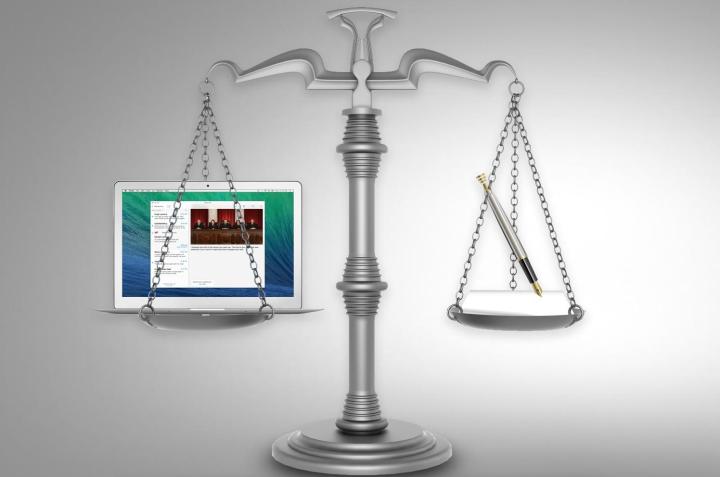
Last week, the Associated Press published what may, in fact, be the understatement of the century: The justices of the Supreme Court of the United States “have a ways to go to understand technology.”
This is based on what the news agency learned from Justice Elena Kagan, who told the audience at an event in Rhode Island last Tuesday that she and her colleagues have not yet begun to use email, at least in a professional capacity.
I don’t fault them for skipping the Google Glass Explorers bandwagon, or failing to have a Bitcoin wallet.
“The justices are not necessarily the most technologically sophisticated people,” said Kagan. “The court hasn’t really ‘gotten to’ email.”
Instead, reports the AP, the justices “communicate with one another through memos printed on ivory paper.” And the memos are passed from one justice to another with the help of people professional titled “chamber aides.”
Now, nobody’s saying SCOTUS justices need to be early adopters. I don’t fault them for skipping the Google Glass Explorers bandwagon, or failing to have a Bitcoin wallet. But I think we can all agree that the people in our government, from the Supreme Court on down, need to understand the technology most people use, and how that technology fits into our lives in an intimate way.
This is especially true for Supreme Court justices, who are tasked with interpreting the laws of our land – laws that are increasingly intertwined with the technology we use and need to live our lives.

One day, for example, we may find SCOTUS considering whether or not the Fourth Amendment should apply to the content we share and the messages we send via social networks – a question that, as I’ve previously reported, is very much up in the air. Privacy rights, surveillance activities, copyright issues, free speech online, video game violence, and Internet freedom – all of this and more will come before the Supreme Court, and they will have the final word on how our society treats these issues.
The fact that they don’t use Facebook, while understandable, is just not okay.
The same goes for Congress, the people who make up our laws in the first place. As we saw during the debate over the Stop Online Privacy Act in late 2011 and early 2012, most Members simply don’t understand the technical aspects of the Web, causing them to write bills that put the technologies on which we rely in danger.
Granted, I can’t claim to understand all the technical aspects of the Web either, nor, I presume, can the majority of people who use them. So I empathize with SCOTUS justices and Members of Congress who are in over their heads when it comes to this technology stuff. Nobody expects every person nominated for the highest court in the land or elected to Congress to have computer science degrees (and law degrees), or be well-versed in the ways of Snapchat.
Without at least some long-term, first-hand experience with tech, informed decisions by the court are virtually impossible to achieve.
That said, there is a big difference between not understanding all the complicated technical aspects of how an email is sent and not understanding how integral email is to most people’s lives. (Though, in some cases, how email works on a technical level is quite important, too.) It is the nitty-gritty aspects of how real people use technology in real life that should inform the courts and lawmakers about how to address laws that affect technology. And without at least some long-term, first-hand experience with tech, such informed decisions are virtually impossible to achieve.
To the justice’s credit, they occasionally seek the help of court clerks, who are often younger and more experienced with modern tech, to gain some insight. Once, according to Kagan, the justices even got some hands-on time with video games, as the court considered the violence often depicted in games. “It was kind of hilarious,” she said.
Hey, that’s at least something, I suppose. But until those at the highest echelons of government climb down from their ivory paper towers, and really learn how important and nuanced technology is in the lives of everyday people, our technology laws will remain stuck in an era when titles like “chamber aide” didn’t sound so ridiculous.
Supreme Court image courtesy of Gary Blakeley/Shutterstock
Editors' Recommendations
- How to block an email address in Gmail to stop spam
- How to create disposable email addresses
- Quibi, JetBlue, and more leaked your email to advertisers, report finds
- What is Libra? Here’s what you need to know about Facebook’s new cryptocurrency


